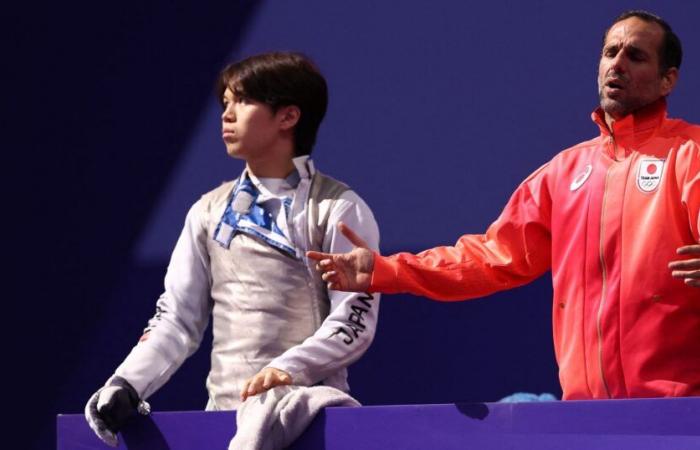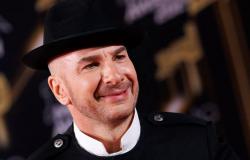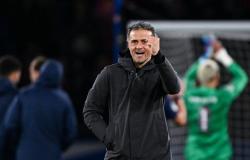Emeric Clos, Erwan Le Pechoux and Grégory Koenig gathered in the same room, it is not only the sign of the imminence of a major foil tournament, but also the assurance of titles, or almost. Between them, they won the individual and team titles of the last two Olympics at the head of their selection. Among the Blues, Emeric Clos won Olympic gold in 2021 in Tokyo, with Erwan Le Pechoux as an athlete. Barely titled, the Provençal took the reins of the Japanese men’s team with which he came to win at the Grand Palais last summer. Meanwhile, in Japan in 2021 and in Paris in 2024, Gregory Koenig led his protégé Ka Long Cheung to an individual Olympic double.
It makes sense to say that French foil fencers know how to train their athletes particularly well. But it’s difficult to say what exactly makes the Tricolores successful, to explain this “French Touch” so improvised. Where the Italians are known for their aggressiveness and their tendency to close the distance until almost coming into close combat with every touch, where the Americans are known for being fearless of nothing or people, attacking their rivals without taking into account their reputation or their track record, the description becomes more delicate and foggy concerning the Tricolores. How to explain the French school? Perhaps by breaking it down into two parts: technical and mental.
Some French specificities
Double Olympic champion, team in 2000 then individual in 2004, Brice Guyart is now vice-president of the French federation. Faced with this question, he first insists on the very complete profile of the French foilists. “They are athletes who know how to attack and defend. When you meet a Frenchman, you know it won’t be an easy match“, he describes. Grégory Koenig is more precise: “Just by the guard position you can see if he’s French or not. If the tip is in front, there is a good chance that it is a Frenchman. If the tip is at the top, it is most certainly an Italian“.
Once engaged in the assault, the French touch is also identifiable. Brice Guyart: “We have a tendency to be far away to showcase our power, our agility. But being far away today, you can go too fast and miss your target. So we must also accept, sometimes, to come close“. This tendency to move a lot on the track differentiates the Tricolores from other nations.
We are more on ‘slow-fast’
“We take a lot of risks, we do a lot of track work while the Asians go ‘fast-fast’, they stay in the middle a lot, it starts very quickly and it ends very quicklyexplains Emeric Clos. We are more on ‘slow-fast’‘”. Through contact with foreign coaches, Asian foilists have evolved a lot in their approach: “Their athletes were a little crazy, they went in all directions and they were easy to counterhe continues. The French coaches who left for Asia therefore brought them a different tactical approach and a range of moves which is enormous and has become more difficult to read today.“.
Technical and tactical differences which, however, tend to disappear according to Erwan Le Pechoux. To support his point, he takes the example of the American Nick Itkin, then in the middle of warming up with the American delegation a few meters from his Japanese team. “He is American but his father emigrated to the United States from Ukraine and he learned fencing from his father. There are many Egyptians also in the United States. In Asia, it’s the same. At the moment, there are French people, but before that, there were coaches from other countries“.
It is rather on the mind that the differences are made when listening to it. In any case, it is in this area that he prioritized when arriving in Japan. “I insisted a lot at the start on awareness of their qualities and their possibilitieshe explains. Before, it was the same shooters, but they didn’t believe it. When they beat a team, it was an achievement for them. And now Japan has become a strong nation“. The Japanese record confirms this: under the orders of the Frenchman, the Japanese team won its first world team title in 2023, and its first Olympic coronation at the Paris 2024 Games.
The Japanese are very different from before
The mental aspect is also the first element put forward by Enzo Lefort regarding French coaches. Olympic team champion in 2021, Lefort has also been world champion three times, by team and individually. He remembers: “When Franck Boidin and Emeric Clos arrived in the French team in 2013, they wanted to give us back the desire to play on the track. What French coaches bring to foreign countries is fun. The Japanese are very different from before. Now we see them having fun, they no longer fear losing, they no longer beat themselves up when they take a hit. For his part, Ka Long Cheung is no longer afraid of making a mistake. in the mentality that French coaches bring things abroad“.
Enzo Lefort and the Blues of foil during Euro 2024.
Credit: Getty Images
Julien Mertine, also an Olympic and world champion, agrees with his teammate: “The Hong Kongers and the Japanese were also training hard before the arrival of Grégory (Koenig) and Erwan (Le Pechoux), but they were filling boxes. The French brought pleasure on the track and also off it, in terms of exchanges, in their relationships. When an athlete sits, closed in on himself or when he has his shoulders open and chats with everyone, he is not the same opponent on the track“.
The importance of the psychological aspect
Le Parisien, who could announce his retirement at the end of the CIP this weekend, adds: “On the psychological aspect, Franck Boidin is incredible. He grabs your shoulder and that’s enough to completely boost you up. Before you believe in yourself, someone has to make you believe that it’s possible, and when your coach believes in you, you can put all the touches in the world“.
With a mischievous look, Erwan Le Péchoux takes advantage of the presence of the new leaders of the French federation to ask a question (very) loudly: “It remains to be seen why the federation lets so many coaches go abroad? At the Asian Championships in 2024, there were eleven French coaches of all weapons… but some left because we simply didn’t retain them“. A cause and effect link emerges all the more easily as French foil is no longer dominant, despite its 2021 Olympic gold and its bronze in Paris. As it stands, the last world title dates back to 2014.
Therefore, keeping the best coaches within the French fold will be one of the areas of work of the next national technical director supposed to be appointed at the beginning of March, and why not also bring back those who have gone into exile. Brice Guyart hopes so: “Erwan Le Péchoux, we failed to keep him, to offer him something sufficiently interesting from a sporting point of view and I’m not just talking about the financial aspect. In the short term, it is a loss but in the medium or long term, it can be very effective. He has gained experience and could come back stronger to serve the French“. In the CV of the future DTN of French fencing, you may need to know how to recite Joachim Du Bellay’s poem by heart: “Happy is he who, like Ulysses, has had a beautiful journey…“






